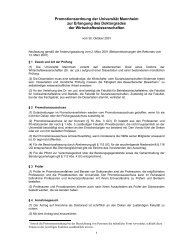The returns to cognitive and non-cognitive abilities in Germany
The returns to cognitive and non-cognitive abilities in Germany
The returns to cognitive and non-cognitive abilities in Germany
You also want an ePaper? Increase the reach of your titles
YUMPU automatically turns print PDFs into web optimized ePapers that Google loves.
(average of 3.8 <strong>in</strong> comparison <strong>to</strong> 3.5, t-value of -3.335) which might have <strong>to</strong> do with their<br />
his<strong>to</strong>ric experience of hav<strong>in</strong>g been forced <strong>to</strong> live <strong>in</strong> an authoritarian regime. As po<strong>in</strong>ted out,<br />
the results do not change. We further estimated models that <strong>in</strong>cluded either IQ or personality<br />
<strong>in</strong>dica<strong>to</strong>rs <strong>to</strong> control of possible <strong>in</strong>terdependencies between cognition <strong>and</strong> personality traits.<br />
Aga<strong>in</strong>, by <strong>and</strong> large <strong>in</strong> l<strong>in</strong>e with Mueller <strong>and</strong> Plug (2006), there were no substantial changes<br />
<strong>in</strong> the results. 18<br />
F<strong>in</strong>ally, s<strong>in</strong>ce we are well aware of the risk of reverse causality we estimated<br />
earn<strong>in</strong>gs equations us<strong>in</strong>g data from the 2007 wave of the SOEP, i.e. regress<strong>in</strong>g wages on<br />
socio-demographics <strong>and</strong> job characteristics from 2007 but <strong>in</strong>clud<strong>in</strong>g the <strong>in</strong>dica<strong>to</strong>rs of<br />
cognition from 2006 <strong>and</strong> personality from 2005. <strong>The</strong> idea here is <strong>to</strong> elim<strong>in</strong>ate any concurrent<br />
effects of wages on cognition or personality. S<strong>in</strong>ce the result<strong>in</strong>g sample size was rather small<br />
(roughly 1,300 observations), it is not surpris<strong>in</strong>g that only a few coefficients were<br />
statistically different from zero. In particular, we f<strong>in</strong>d no statistically significant coefficients<br />
<strong>in</strong> these cross-sectional wage regressions for females. <strong>The</strong> results for males are re<strong>in</strong>forced<br />
<strong>in</strong>asmuch as there are wage penalties for external locus of control. <strong>The</strong>re f<strong>in</strong>ally is a wage<br />
premium for fluid <strong>in</strong>telligence <strong>in</strong> a most parsimonious basel<strong>in</strong>e model, i.e. a model <strong>in</strong>clud<strong>in</strong>g<br />
only the set of socio-demographic controls, which however vanishes once job characteristics<br />
are <strong>in</strong>cluded.<br />
5. Conclusions<br />
<strong>The</strong>re is a consensus among labor economists that traditional human capital variables<br />
such as education or experience are not sufficient <strong>to</strong> predict wages <strong>and</strong> other labor market<br />
outcomes. At the same time, there is an <strong>in</strong>creas<strong>in</strong>g awareness of the importance of both<br />
<strong>cognitive</strong> <strong>abilities</strong> <strong>and</strong> personality traits as determ<strong>in</strong>ants of labor market success. Cognitive<br />
skills may result <strong>in</strong> better job performance <strong>and</strong> productivity differences which directly<br />
26















